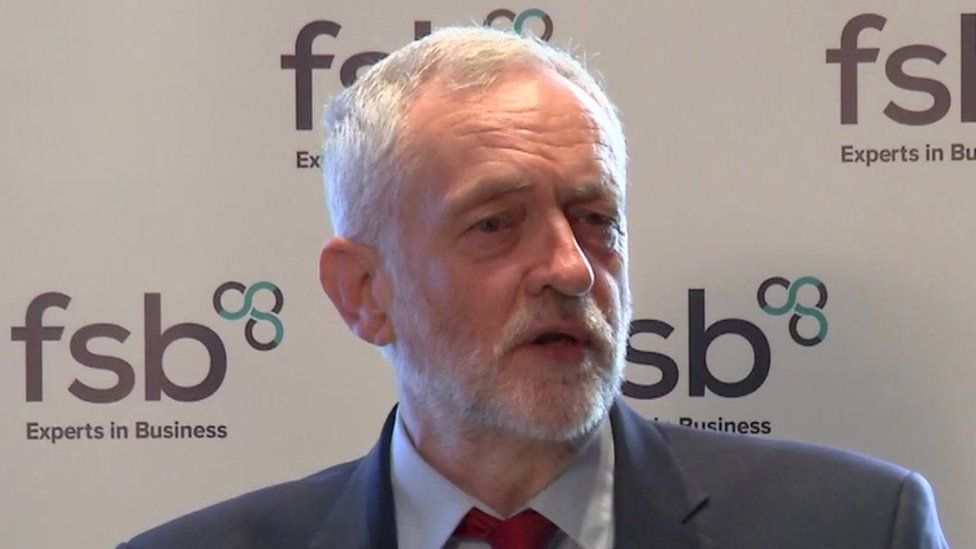Firms dispute Jeremy Corbyn's claim they pay bills late
- Published
- comments

Jeremy Corbyn has accused some of Britain's biggest firms - including Capita and Marks and Spencer - of late payment to small suppliers.
The Labour leader said big business was holding back £26bn a year by not paying bills on time and it was driving 50,000 small firms out of business.
He vowed to tackle this "national scandal" if Labour won power.
A string of firms named by Mr Corbyn said they did not recognise his figures on late payments.
Labour researchers took the data from a report by Experian, but the credit reference agency said it should not be used as an "overall barometer of how a company pays suppliers".
In response, a spokesperson for Jeremy Corbyn said: "To highlight the scale of the problem, we used Experian data about how late payments by major companies to their suppliers are, once invoices become due.
"Drawing attention to this issue, so vital to the success of our small businesses and health of our economy, is itself overdue."
In a speech to the Federation of Small Businesses, Mr Corbyn said: "Cash is king for any business, and big companies are managing their cash by borrowing - interest free - from their suppliers.
"Some of the biggest names in business are holding cash piles that don't actually belong to them.
"It's a national scandal. And it's stopping businesses from growing and causing thousands to go bust every year.
"It kills jobs and holds back economic growth."
Late payment fines?
Mr Corbyn said that if Labour won the next election, it would consider fining late payers and require companies bidding for public sector contracts to pay suppliers within 30 days.
He claimed Capita, which is one of the UK government's biggest contractors, paid suppliers 82 days later on average than its agreed terms.
A Capita spokesman said: "We don't recognise these figures whatsoever and, according to our own data and analysis, these claims do not correctly reflect our payment behaviours.
"We pay 90% of all invoices received across our supplier base within 30 days of receipt."
Mr Corbyn also named Marks and Spencer, which he claimed paid its suppliers an average of 72 days over terms.
M&S said: "We don't recognise these numbers at all. Over 99% of our supplier invoices are paid on time."
The retail giant said it had signed the government's prompt payment code, a voluntary agreement aimed at ensuring big firms pay their suppliers in reasonable time.
And, like all big companies, it would be publishing performance data on payment to suppliers from next year, it added.
Other firms named by the Labour leader, including BT, Vodafone, E.On and the National Grid, have also said they do not recognise Mr Corbyn's figures.
Labour's late payment figures come from a "random selection" of data from credit reports produced by Experian.
The credit reference agency said it had not had any input into Labour's report and the figures were taken from a commercially available report aimed at giving small businesses an idea of how late some companies can be with payments.
An Experian spokesman said the figures solely related to invoices settled late and did not take into account payments that had been made on time.
"As such, the data relates to how late a business can expect any late payments to be, and not the company's overall track record on the payment of suppliers," the spokesman said.
"For example, if a company settles 1,000 invoices on time but 50 are paid an average of 20 days late, their 'days beyond terms' figure would be 20.
"It is intended for indicative purposes only, to inform specific business decisions, and we would not recommend it is used as an overall barometer of how a company pays suppliers."
'Crash the economy'
The £26bn figure quoted by Labour for late payments was based on data from Bacs Payment Schemes Ltd, formerly known as the Bankers' Automated Clearing Services.
The government is committed to strengthening the prompt payment code - and ensuring all major government suppliers sign it - but Mr Corbyn said they had "not done enough".
He was backed by the Federation of Small Business.
FSB national chairman Mike Cherry said: "Jeremy Corbyn's proposals today are important, as we build a cross-party consensus for further action.
"The government's transparency reforms are vital, but not sufficient."
Mr Corbyn also pledged to cut red tape for small businesses with a turnover of less than £83,000 per year by dropping the requirement to issue quarterly financial reports.
And he repeated Labour's pledge to create regional investment banks to make it easier for businesses to access finance.
He said he wanted to create a "level playing field" for entrepreneurs by increasing corporation tax on big business and cracking down on tax avoidance, with the cash raised to be spent on improving skills training.
But the Conservatives said Labour's policies would mean "higher corporation tax, an increased deficit and more economic instability".
Conservative MP Amanda Milling MP, a member of the Commons business committee, said: "With Jeremy Corbyn in charge of the nation's finances, Labour would crash the economy just like they did last time."
- Published6 April 2017
- Published3 May 2017